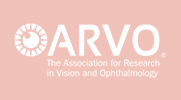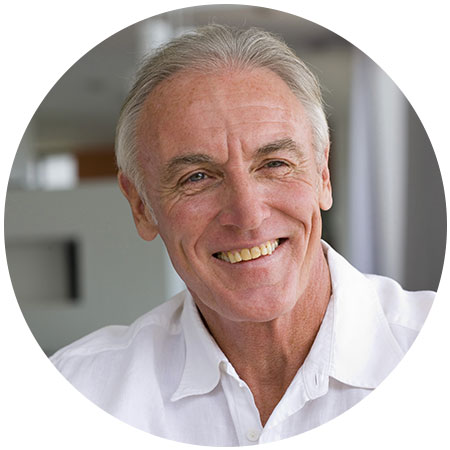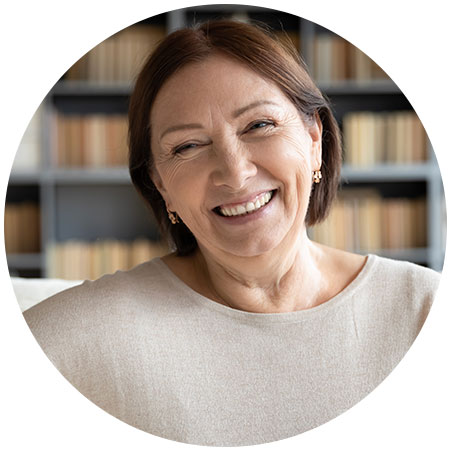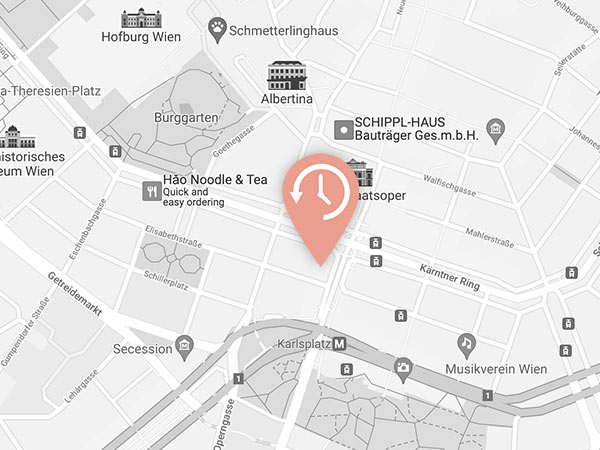Enjoy freedom from reading glasses after lifestyle cataract surgery
Turn back the clock on your eyes and feel younger
Enjoy clear vision free from cataracts and glasses
Being told you have a cataract is never fun. But with lifestyle cataract surgery, this common age-related condition becomes a blessing in disguise. In a matter of moments, we’ll have given you the best vision your eyes are capable of seeing, without cataracts AND with a significantly reduced dependence on glasses!
Feel younger than your years
Cataracts normally come as an unwelcome reminder that age is catching up with you. This can leave you feeling a little deflated. However, after lifestyle cataract surgery, patients feel reinvigorated. Not only are they relieved to have addressed a pain point in their life, but they feel more attractive and confident than ever before.
Enjoy life without the hassle
People in their 50’s and beyond live full and active lives, which doesn’t have to change with age. After lifestyle cataract surgery, patients can continue to enjoy unclouded vision and, as an added bonus, can see a range of distances without their glasses. So whether you’re reading your phone, driving your car or applying make-up, you’ll never be burdened by your specs again.
Know that age is just a number
Many people make the mistake of thinking that ageing eyes are just a part of life and something that you must accept. You don’t. Our patients will tell you that the arrival of cataracts was the start of a whole new chapter in their life, full of new adventures, fun and freedom.
Enjoy freedom from reading glasses after lifestyle cataract surgery
Turn back the clock on your eyes and feel younger
Enjoy clear vision free from cataracts and glasses
Being told you have a cataract is never fun. But with lifestyle cataract surgery, this common age-related condition becomes a blessing in disguise. In a matter of moments, we’ll have given you the best vision your eyes are capable of seeing, without cataracts AND with a significantly reduced dependence on glasses!
Feel younger than your years
Cataracts normally come as an unwelcome reminder that age is catching up with you. This can leave you feeling a little deflated. However, after lifestyle cataract surgery, patients feel reinvigorated. Not only are they relieved to have addressed a pain point in their life, but they feel more attractive and confident than ever before.
Enjoy life without the hassle
People in their 50’s and beyond live full and active lives, which doesn’t have to change with age. After lifestyle cataract surgery, patients can continue to enjoy unclouded vision and, as an added bonus, can see a range of distances without their glasses. So whether you’re reading your phone, driving your car or applying make-up, you’ll never be burdened by your specs again.
Know that age is just a number
Many people make the mistake of thinking that ageing eyes are just a part of life and something that you must accept. You don’t. Our patients will tell you that the arrival of cataracts was the start of a whole new chapter in their life, full of new adventures, fun and freedom.
Have you been told you have cataracts?
See which scenario below sounds most like you to discover your best solution

I’m too young for cataracts but I don’t mind wearing glasses
You got along just fine with your reading glasses but now you’ve been told you have early cataracts.
Find out how to fix your cataracts early so you can resume life with your favourite pair of glasses.

I’m too young for cataracts AND hate my reading glasses
If getting your first pair of reading glasses was a little disheartening, being told you have cataracts can be a real low-blow.
Find out how to fix your cataracts AND use the opportunity to eliminate your need for reading glasses at the same time.
With lifestyle cataract surgery, patients can enjoy better vision than they’ve had in years
Quickly discover how this life-changing treatment can fix cataracts and remove the hassle of reading glasses
Fix your cataracts early and read again without glasses in 3 simple steps
Many people don’t realise they have options when it comes to cataract surgery. We’ll help you make the right choice
Thousands of happy patients turn back the clock on their eyes
Discover how they restored their youth with our rejuvenating eye treatments
Zum Schutz der Privatsphäre haben wir die Bilder der echten Patienten, die diese Erfahrungsberichte geliefert haben, ersetzt.
Meet your cataract surgery experts in Vienna
Our friendly eye specialists are here to turn back the clock on your eyes

Assoc. Prof. Priv. Doz. Dr. Christina Leydolt
Ophthalmologist, Lens & Cataract Surgery Specialist
FEBO
“I am passionate about giving patients a better quality of life through better vision. I have always been fascinated by eye surgery and the constant new technologies and advances in this field.” – Dr. Christina Leydolt
Dr. Leydolt is an ophthalmologist who specialises in cataract and lens surgery.
She believes every patient is unique and has their own needs and requirements for vision. These requirements depend on hobbies, lifestyle and specific desires. Therefore, finding an individually tailored treatment together with you is a big priority of hers.

Dr. Victor Derhartunian
Ophthalmologist, Refractive Surgery Specialist
FEBO
“Every person is different; most people want the best quality of vision. Combining these two worlds makes this job fascinating and unique for me every day.” – Dr. Victor Derhartunian
Dr. Derhartunian is a renowned ophthalmologist and eye surgeon.
Since his residency, refractive surgery has been Dr. Derhartunian’s passion. He enjoys combining medicine, cutting-edge technology and sophisticated research and then translating that into his clinical work. He especially enjoys the customisation involved in eye surgery and tailoring treatment to the needs of the patient.
Academic resources on Lifestyle cataract surgery
Learn more about Lifestyle cataract surgery from authoritative sources






























